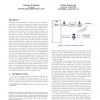Free Online Productivity Tools
i2Speak
i2Symbol
i2OCR
iTex2Img
iWeb2Print
iWeb2Shot
i2Type
iPdf2Split
iPdf2Merge
i2Bopomofo
i2Arabic
i2Style
i2Image
i2PDF
iLatex2Rtf
Sci2ools
104
Voted
EDBT
2008
ACM
2008
ACM
Robustness in automatic physical database design
Automatic physical database design tools rely on "what-if" interfaces to the query optimizer to estimate the execution time of the training query workload under different candidate physical designs. The tools use these what-if interfaces to recommend physical designs that minimize the estimated execution time of the input training workload. In this paper, we argue that minimizing estimated execution time alone can lead to designs with inherent problems. In particular, if the optimizer makes an error in estimating the execution time of some workload queries, then the recommended physical design may actually harm the workload instead of benefiting it. In this sense, the physical design is risky. Moreover, if the production queries are slightly different from the training queries, the recommended physical design may not benefit them at all. In this sense, the physical design is not general. We define Risk and Generality as two new metrics to evaluate the quality of a proposed p...
Database | EDBT 2008 | Generic Physical Design | Physical Database Design | Physical Design Advisor |
Related Content
| Added | 08 Dec 2009 |
| Updated | 08 Dec 2009 |
| Type | Conference |
| Year | 2008 |
| Where | EDBT |
| Authors | Kareem El Gebaly, Ashraf Aboulnaga |
Comments (0)

